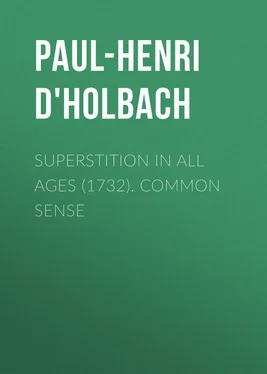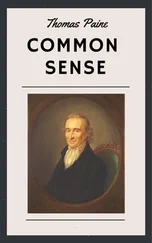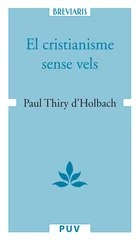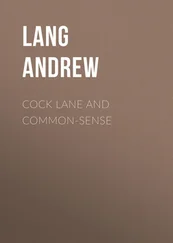Paul-Henri Holbach - Superstition In All Ages (1732). Common Sense
Здесь есть возможность читать онлайн «Paul-Henri Holbach - Superstition In All Ages (1732). Common Sense» — ознакомительный отрывок электронной книги совершенно бесплатно, а после прочтения отрывка купить полную версию. В некоторых случаях можно слушать аудио, скачать через торрент в формате fb2 и присутствует краткое содержание. Жанр: Философия, literature_18, foreign_prose, на французском языке. Описание произведения, (предисловие) а так же отзывы посетителей доступны на портале библиотеки ЛибКат.
- Название:Superstition In All Ages (1732). Common Sense
- Автор:
- Жанр:
- Год:неизвестен
- ISBN:нет данных
- Рейтинг книги:3 / 5. Голосов: 1
-
Избранное:Добавить в избранное
- Отзывы:
-
Ваша оценка:
- 60
- 1
- 2
- 3
- 4
- 5
Superstition In All Ages (1732). Common Sense: краткое содержание, описание и аннотация
Предлагаем к чтению аннотацию, описание, краткое содержание или предисловие (зависит от того, что написал сам автор книги «Superstition In All Ages (1732). Common Sense»). Если вы не нашли необходимую информацию о книге — напишите в комментариях, мы постараемся отыскать её.
Superstition In All Ages (1732). Common Sense — читать онлайн ознакомительный отрывок
Ниже представлен текст книги, разбитый по страницам. Система сохранения места последней прочитанной страницы, позволяет с удобством читать онлайн бесплатно книгу «Superstition In All Ages (1732). Common Sense», без необходимости каждый раз заново искать на чём Вы остановились. Поставьте закладку, и сможете в любой момент перейти на страницу, на которой закончили чтение.
Интервал:
Закладка:
XXXVII. – THE WONDERS OF NATURE EXPLAIN THEMSELVES BY NATURAL CAUSES
Is there anything more surprising than the logic of so many profound doctors, who, instead of acknowledging the little light they have upon natural agencies, seek outside of nature – that is to say, in imaginary regions – an agent less understood than this nature, of which they can at least form some idea? To say that God is the author of the phenomena that we see, is it not attributing them to an occult cause? What is God? What is a spirit? They are causes of which we have no idea. Sages! study nature and her laws; and when you can from them unravel the action of natural causes, do not go in search of supernatural causes, which, very far from enlightening your ideas, will but entangle them more and more and make it impossible for you to understand yourselves.
XXXVIII – CONTINUATION
Nature, you say, is totally inexplicable without a God; that is to say, in order to explain what you understand so little, you need a cause which you do not understand at all. You pretend to make clear that which is obscure, by magnifying its obscurity. You think you have untied a knot by multiplying knots. Enthusiastic philosophers, in order to prove to us the existence of a God, you copy complete treatises on botany; you enter into minute details of the parts of the human body; you ascend into the air to contemplate the revolutions of the stars; you return then to earth to admire the course of the waters; you fly into ecstasies over butterflies, insects, polyps, organized atoms, in which you think to find the greatness of your God; all these things will not prove the existence of this God; they will only prove that you have not the ideas which you should have of the immense variety of causes and effects that can produce the infinitely diversified combinations, of which the universe is the assemblage. This will prove that you ignore nature, that you have no idea of her resources when you judge her incapable of producing a multitude of forms and beings, of which your eyes, even by the aid of the microscope, see but the least part; finally, this will prove, that not being able to know the sensible and comprehensible agents, you find it easier to have recourse to a word, by which you designate an agent, of whom it will always be impossible for you to form any true idea.
XXXIX. – THE WORLD HAS NOT BEEN CREATED, AND MATTER MOVES BY ITSELF
They tell us gravely that there is no effect without a cause; they repeat to us very often that the world did not create itself. But the universe is a cause, not an effect; it is not a work, has not been made, because it was impossible that it should be made. The world has always been, its existence is necessary. It is the cause of itself. Nature, whose essence is visibly acting and producing, in order to fulfill her functions, as we see she does, needs no invisible motor far more unknown than herself. Matter moves by its own energy, by the necessary result of its heterogeneity; the diversity of its movements or of its ways of acting, constitute only the diversity of substances; we distinguish one being from another but by the diversity of the impressions or movements which they communicate to our organs.
XL. – CONTINUATION
You see that everything in nature is in a state of activity, and you pretend that nature of itself is dead and without energy! You believe that all this, acting of itself, has need of a motor! Well! who is this motor? It is a spirit, that is to say, an absolutely incomprehensible and contradictory being. Conclude then, I say to you, that matter acts of itself, and cease to reason about your spiritual motor, which has nothing that is necessary to put it into motion. Return from your useless excursions; come down from an imaginary into a real world; take hold of second causes; leave to theologians their "First Cause," of which nature has no need in order to produce all the effects which you see.
XLI. – OTHER PROOFS THAT MOTION IS IN THE ESSENCE OF MATTER, AND THAT IT IS NOT NECESSARY TO SUPPOSE A SPIRITUAL MOTOR
It is but by the diversity of impressions or of effects which substances or bodies make upon us, that we feel them, that we have perceptions and ideas of them, that we distinguish them one from another, that we assign to them peculiarities. Moreover, in order to perceive or to feel an object, this object must act upon our organs; this object can not act upon us without exciting some motion in us; it can not produce any motion in us if it is not itself in motion. As soon as I see an object, my eyes must be struck by it; I can not conceive of light and of vision without a motion in the luminous, extended, and colored body which communicates itself to my eye, or which acts upon my retina. As soon as I smell a body, my olfactory nerve must be irritated or put into motion by the parts exhaled from an odorous body. As soon as I hear a sound, the tympanum of my ear must be struck by the air put in motion by a sonorous body, which could not act if it was not moved of itself. From which it follows, evidently, that without motion I can neither feel, see, distinguish, compare, nor judge the body, nor even occupy my thought with any matter whatever. It is said in the schools, that the essence of a being is that from which flow all the properties of that being. Now then, it is evident that all the properties of bodies or of substances of which we have ideas, are due to the motion which alone informs us of their existence, and gives us the first conceptions of it. I can not be informed or assured of my own existence but by the motions which I experience within myself. I am compelled to conclude that motion is as essential to matter as its extension, and that it can not be conceived of without it. If one persists in caviling about the evidences which prove to us that motion is an essential property of matter, he must at least acknowledge that substances which seemed dead or deprived of all energy, take motion of themselves as soon as they are brought within the proper distance to act upon each other. Pyrophorus, when enclosed in a bottle or deprived of contact with the air, can not take fire by itself, but it burns as soon as exposed to the air. Flour and water cause fermentation as soon as they are mixed. Thus dead substances engender motion of themselves. Matter has then the power to move itself, and nature, in order to act, does not need a motor whose essence would hinder its activity.
XLII. – THE EXISTENCE OF MAN DOES NOT PROVE THAT OF GOD
Whence comes man? What is his origin? Is he the result of the fortuitous meeting of atoms? Was the first man formed of the dust of the earth? I do not know! Man appears to me to be a production of nature like all others she embraces. I should be just as much embarrassed to tell you whence came the first stones, the first trees, the first elephants, the first ants, the first acorns, as to explain the origin of the human species. Recognize, we are told, the hand of God, of an infinitely intelligent and powerful workman, in a work so wonderful as the human machine. I would admit without question that the human machine appears to me surprising; but since man exists in nature, I do not believe it right to say that his formation is beyond the forces of nature. I will add, that I could conceive far less of the formation of the human machine, when to explain it to me they tell me that a pure spirit, who has neither eyes, nor feet, nor hands, nor head, nor lungs, nor mouth, nor breath, has made man by taking a little dust and blowing upon it. The savage inhabitants of Paraguay pretend to be descended from the moon, and appear to us as simpletons; the theologians of Europe pretend to be descended from a pure spirit. Is this pretension more sensible?
Читать дальшеИнтервал:
Закладка:
Похожие книги на «Superstition In All Ages (1732). Common Sense»
Представляем Вашему вниманию похожие книги на «Superstition In All Ages (1732). Common Sense» списком для выбора. Мы отобрали схожую по названию и смыслу литературу в надежде предоставить читателям больше вариантов отыскать новые, интересные, ещё непрочитанные произведения.
Обсуждение, отзывы о книге «Superstition In All Ages (1732). Common Sense» и просто собственные мнения читателей. Оставьте ваши комментарии, напишите, что Вы думаете о произведении, его смысле или главных героях. Укажите что конкретно понравилось, а что нет, и почему Вы так считаете.












